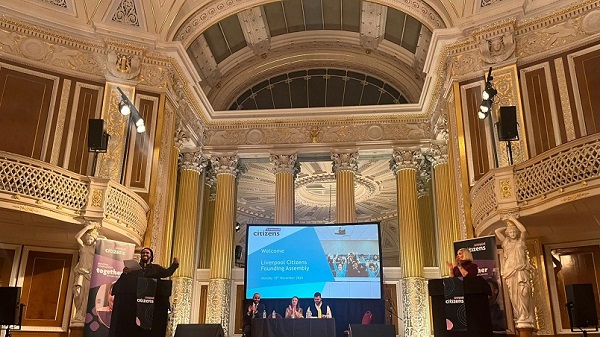What does it mean to be a citizen? Reflections from the Founding Assembly of Liverpool Citizens
Posted on: 22 November 2024 by James Hickson in Blog

On 18th November 2024, the Founding Assembly of Liverpool Citizens – a new chapter of the national organisation, Citizens UK – was held at the city’s St George’s Hall.
The Assembly brought together more than 500 people from across the city, representing a diverse alliance of founding organisations – including the Heseltine Institute – who have committed to work for the common good of the city.
The Heseltine Institute is proud to be a member of an alliance that shares our commitment to address inequalities and improve outcomes in the city that we live and work in. Moreover, as a significant anchor institution in the city and its largest accredited real Living Wage employer, it was great to represent the University of Liverpool during this Founding Assembly.
The Assembly was carefully planned and choreographed, combining conviviality and personal testimonies with more formal engagement with local decision-makers. It kicked off with a performance from the Asylum Link Merseyside Choir, followed by an overview of the development of Liverpool Citizens. Next came a roll call of the founding member organisations that have come together from across the city to achieve change. This included faith organisations such as St James in the City, Al Rahma Mosque, and St Teresa’s Norris Green; housing providers such as Regenda, South Liverpool Homes, and Plus Dane; and education providers such as Monksdown Primary School, Dixons Fazakerley Academy, and Liverpool Hope Creative Campus.
Next, key local decision makers (including the Mayor of Liverpool City Region, Leader of Liverpool City Council, the Chief Executive of the Cheshire and Merseyside Integrated Care Board, as well as transport executives from Arriva and Merseyrail) were welcomed to pledge their commitment to work long-term with Liverpool Citizens. This commitment was immediately put to the test, with decision-makers asked to respond to a series of asks from Liverpool Citizens on the issues that mattered to their members, as identified through extensive listening campaigns. The asks were backed with hard-hitting and heartfelt stories of people’s everyday challenges across the city: from the reliability and affordability of local bus services to the availability of mental health care.
This Assembly model builds on the well-tested approach to community organising used by Citizens UK, which has helped to deliver a number of transformative campaigns over recent years. For example, as a result of their campaign for the Real Living Wage, there are now some 15,000 accredited Living Wage employers across the UK, ensuring that hundreds of thousands more workers are paid enough to meet the cost of living.
However, from a personal perspective, the Assembly also helped to reveal a radically different vision of democratic politics, and of democratic citizenship itself. It demonstrated that:
Citizens are active. In contrast to a dominant approach to politics that tends to treat citizens as passive ‘customers’ or ‘service users’, the Citizens UK approach instead sees all individuals as active participants in local political life, who by working together have the potential to achieve change. This helps to provide a palpable sense of collective agency, energy, and endeavour.
Citizens are diverse. Many forums for participation simply amplify the influence of a vocal minority. However, the Liverpool Citizens Founding Assembly felt meaningfully inclusive, bringing together people from all backgrounds and walks of life. This included voices that are rarely heard in political debates, including care leavers, primary school pupils, and youth club members. Crucially, the Assembly explicitly emphasised the common interests that can be found across these different sections of society, rather than focusing on what divides us.
Citizens are confident. The voices of citizens are worth listening to, and through Liverpool Citizens they have a platform where this value is recognised. The image of children from Monksdown Primary School making the case for free school meals to the Leader of Liverpool City Council, Cllr. Liam Robinson was particularly forceful and demonstrated the importance of giving all citizens – young and old – a meaningful space to exercise their democratic voice and speak truth to power.
Citizens are powerful. The assembly was not just an opportunity for citizens to share their lived experience, it was also an opportunity to leverage a series of public commitments from local decision-makers. This included promises to make Liverpool a Living Wage City, to resolve long-standing issues with public transport, and develop an action plan to improve safety and accessibility in Everton Park. Whilst many of these commitments may be largely in step with the existing aims of policymakers, the Assembly nonetheless created a valuable means of ensuring accountability for public decision-making over the long-term, whilst also beginning of a new conversation with citizens about key local priorities.
Finally, citizens are also hopeful. It is very easy to be cynical about politics. However, the Founding Assembly of Liverpool Citizens highlighted what can be achieved when citizens organise, helping to build a sense of shared hope for real social change. Crucially, though, this change cannot just be gifted from above. It must also be built from below. We all now have an active role to play in delivering it.
Keywords: .